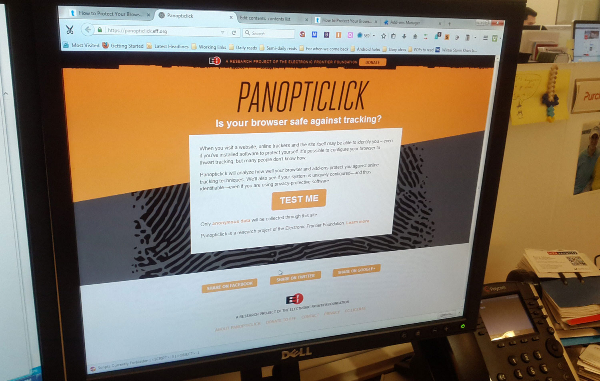How to Protect Your Browser Privacy with Panopticlick
Panopticlick 2.0 can evaluate your browser's privacy quickly and noninvasively, then recommend steps to keep your information safe.
It's no secret that advertisers, government agencies and cybercriminals want your online information very badly, for both benign and nefarious purposes. The Electronic Frontier Foundation (EFF), a San Francisco-based digital-rights advocacy group, has been at the forefront of protecting users' rights online, and it's just released one more tool in the fight against unwanted tracking. Panopticlick 2.0 can evaluate your browser's privacy quickly and non-invasively, then recommend steps to keep your information safe.

The EFF detailed Panopticlick 2.0 in a blog post, in which it described what the software does and why it's important for users to try it out. This version of Panopticlick is based on an experiment that the EFF ran six years ago to see how identifiable individual installations of Web browsers were. The organization found that 84 percent of installed browsers had unique fingerprints that could let their users be tracked, even without those users logging into a single online account.
MORE: Best Antivirus Software and Apps
Panopticlick 2.0 measures four types of browser safety: Whether your browser can block tracking ads (which lift information out of your browser without consent), whether it can block invisible trackers (protocols that websites implement to gather user data without consent), whether it allows ads and scripts from third parties that agree to Do Not Track (a program that gathers data only with user consent) and whether it blocks fingerprinting (the process of identifying a user based on unique browser data).
Using Panopticlick 2.0 is as simple as visiting the Pantopticlick Web page and clicking a single button. The bad news is that unless you have been especially assiduous about browser privacy (even if you have its security locked down), you probably won't pass all four tests. The good news is that it's quite simple to get around that shortcoming by installing the EFF's own Privacy Badger browser extension.
It's only natural for the EFF to promote its own extension (and natural, too, that Panopticlick tests for things that Privacy Badger can address), but it's important to remember that the EFF is not trying to sell you anything. Privacy Badger is free, and supported only by advertisers who abide by Do Not Track. While it's not as efficacious as just using an ad blocker, it's also not as extreme. In theory, Privacy Badger will protect your online presence while still making it possible to support your favorite sites — at least those with ethical ad practices.
Sign up to get the BEST of Tom's Guide direct to your inbox.
Get instant access to breaking news, the hottest reviews, great deals and helpful tips.
Marshall Honorof is a senior editor for Tom's Guide, overseeing the site's coverage of gaming hardware and software. He comes from a science writing background, having studied paleomammalogy, biological anthropology, and the history of science and technology. After hours, you can find him practicing taekwondo or doing deep dives on classic sci-fi.

